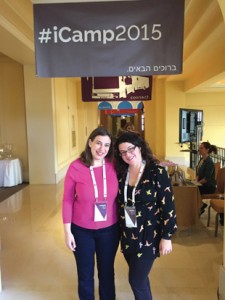Bay Area educators get new angles on how to teach Israel
January 4th, 2016
 Some 250 Jewish educators, educational leaders and funders spent three days in Las Vegas last month discussing and learning new strategies for teaching the subject of Israel to Jews in North America.And, in this case, the hope is that what happened in Vegas won’t stay in Vegas.
Some 250 Jewish educators, educational leaders and funders spent three days in Las Vegas last month discussing and learning new strategies for teaching the subject of Israel to Jews in North America.And, in this case, the hope is that what happened in Vegas won’t stay in Vegas.
“I had pages and pages of notes of how I will be able to implement some of the ideas” that came out of the conference, said attendee Heather Erez, director of youth and family education at Congregation Emanu-El in San Francisco. “I’m looking forward to bringing them back to our teachers and, soon, to the students.”
Titled iCamp, the early December conference was hosted by the Illinois-based iCenter for Israel Education, with the S.F.-based Jewish LearningWorks involved in planning and leading sessions.

Bay Area Jewish educators Leeaht Segev (left) and Devra Aarons at the conference in Las Vegas photo/courtesy devra aarons
Moreover, Vavi Toran, Jewish LearningWorks’ arts and cultural specialist, contributed a chapter to the second edition of “Aleph Bet of Israel Education,” which was unveiled at the conference. The document covers a set of 12 core principles and approaches that together constitute the building blocks of how to teach about Israel. It’s also available for download athttp://www.theicenter.org.“It’s not a set of curriculum or a ‘truth,’ but a roadmap on which to journey down the road of Jewish and Israel education,” said Devra Aarons, executive director of Contra Costa Midrasha. “It’s a process that allows for multiple approaches that is also accessible for multiple types of learners — whatever age, community, sect or gender.”
According to organizers, iCamp is the only conference solely dedicated to Israel education. The only other time it was held was in 2011.
This year’s conference addressed strategies and skills that will help students to connect to Israel on a personal level when they are learning about the culture, history and politics of the Jewish state. Aarons said one of her takeaways was that educators need to work on “creating meaning with our learners that is centered around them.”
Merrill Alpert, director of youth activities for the Far West region of United Synagogue Youth, told the Los Angeles Jewish Journal that educators at Jewish day schools are getting “less and less time in the classroom” to teach Hebrew and about Israel. “Even though Israel education is relevant and important, it’s not as important as English, math or science education,” she told the Jewish Journal. “In order to teach these issues properly, we all need more time.”
The conference was held a week after Brandeis University’s Cohen Center for Modern Jewish Studies released a report showing major gaps in American Jewish college students’ knowledge about Israel. More than half of the 628 Birthright Israel program applicants who took a multiple-choice exam designed to assess Israel literacy had scores of 50 percent or lower, the report said, noting that the students are incapable of “contributing to discourse about Israel on campus in a meaningful way.”
“Effective Israel education reflects excellent education,” said Anne Lanski, the iCenter’s executive director. “It starts with talented educators — individuals who are knowledgeable and deft storytellers, who know how to tap into their students’ passions, and are able to bring Israel to life in nearly any educational environment, be it in a classroom, at a camp, on a bus or elsewhere.
Lev Reuven, a 25-year-old Israeli currently stationed in the Bay Area, was one of 20 Jewish Agency shlichim (emissaries) selected to take part in the conference. Reuven is working with Congregation Rodef Sholom in San Rafael, Camp Newman in Santa Rosa and the Central West Region of NFTY, Reform Judaism’s teen program.
She said the conference made her realize “how hard it is to bring up the topic of Israel and how careful you need to be with it.”Added Aarons: “I heard a lot of people discuss the fear that comes with teaching about Israel — not just in the Bay Area but across North America and even in Israel. Many people talked about how — no matter their personal experience with living in Israel or having Israeli family or friends — if they don’t feel like ‘experts’ they don’t feel equipped to teach Israel, especially the conflict.
“But what was empowering was how the presenters really challenged each of us to be OK with not being experts. That it’s OK to say, ‘I don’t know’ to our learners and invite them to explore and discover with us to uncover the answers. To build relationships, we must invite curiosity, questions and discovery into our learning spaces.”
Other Bay Area attendees included Marla Kolman Antebi, education director at Chochmat HaLev in Berkeley; Leeaht Segev, co-interim director of education at Congregation B’nai Tikvah in Walnut Creek; and Lisa Kay Solomon, author of “Moments of Impact that Accelerate Change” and an adjunct professor of design strategy in the MBA program at the California College of the Arts.
Ilan Vitemberg, director of educational support services at Jewish LearningWorks, noted that “the iCenter considers the Bay Area community a leader in the field of Israel education, particularly in the arena of the use of arts and culture.” The chapter in the “Aleph Bet of Israel Education” on that topic was written by the S.F.-based agency’s Toran.
Aarons said she is a big fan of the “Aleph Bet,” and that she even used “Aleph Bet” cards at a board meeting and staff winter training session. But she also enjoyed being turned on to “Israel Story,” an Israeli-produced podcast that reminds many of NPR’s “This American Life.”
As soon as she got back from Las Vegas, Aarons forwarded links to “Israel Story” to her entire staff at Contra Costa Midrasha, “challenging them to find ways to use some of the stories in each of their classes, whether or not they ‘teach Israel.’ ”
She thinks the engaging stories of “Israel Story” can be used “to bring our teens directly into the world of Israelis and life in Israel.”
Source: “Bay Area educators get new angles on how to teach Israel,” J Weekly, December 31, 2015